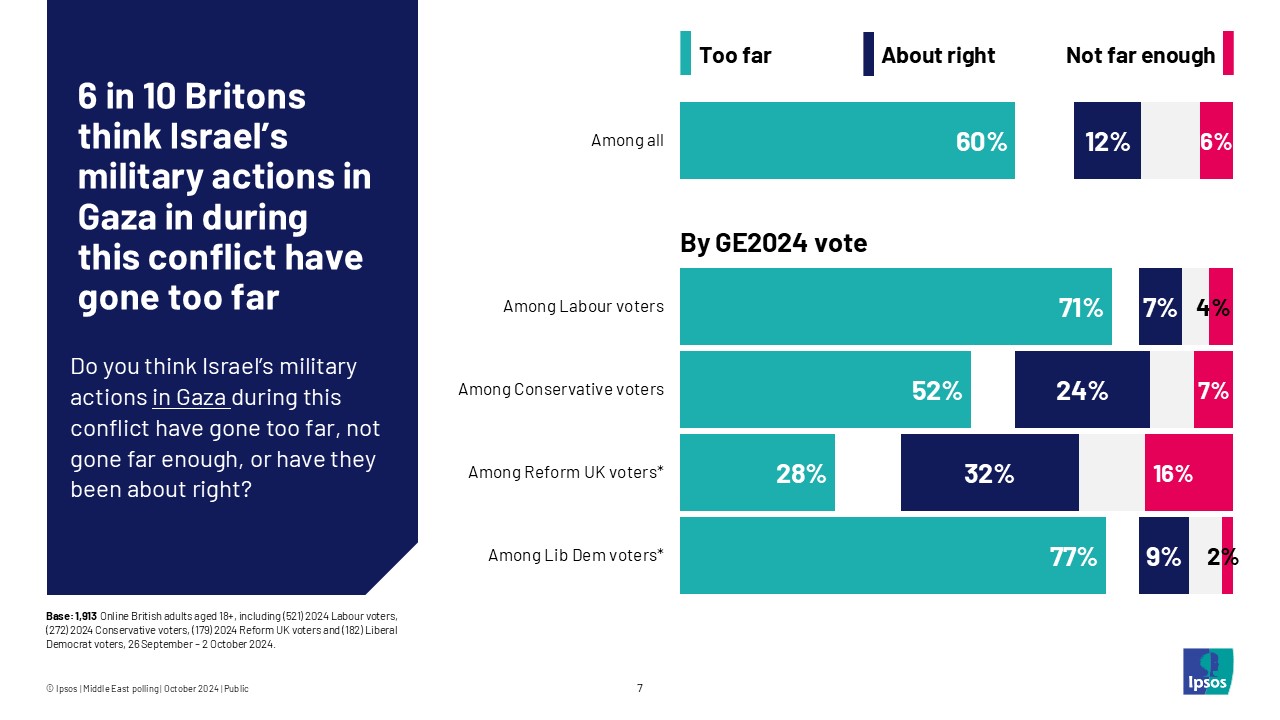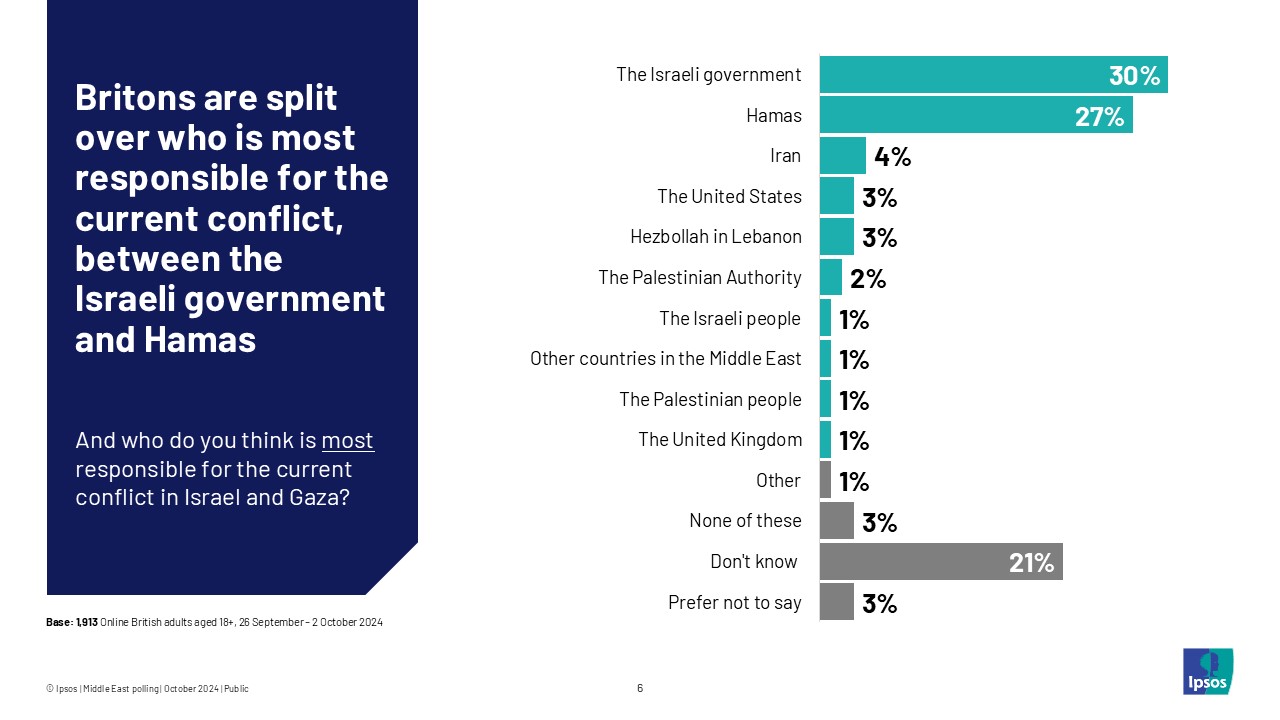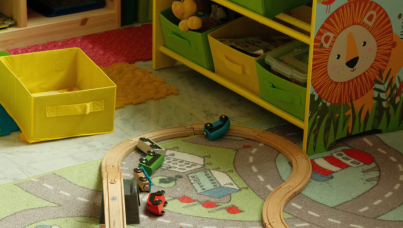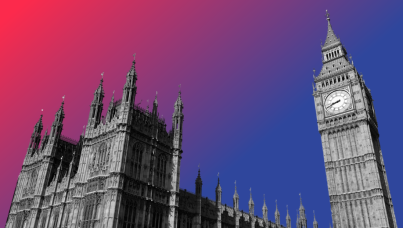UK attitudes toward the conflict in Israel and Gaza
- Both the Israeli Government and Hamas are held responsible for the current conflict in Israel and Gaza
- 3 in 5 of the UK public (60%) say Israel’s military action in Gaza as part of its conflict with Hamas has gone too far
- While 3 in 4 Britons (73%) support an immediate unconditional ceasefire between Israel and Hamas, 60% think it’s unlikely this will be achieved before the end of 2024
- The release of all Israeli civilians being held by Hamas and a mutual agreement from both Israel and Hamas that there will be no future attacks on one another lead as conditions Britons would like to see prioritised in negotiations
One year on from Hamas’s 7th October attacks on Israel last year, a new Ipsos poll examines UK public attitudes towards the conflict in Israel and Gaza. Fieldwork was carried out 26th September – 2nd October 2024, during an intensification of conflict between Israel and Hezbollah in Lebanon, but before the attacks by Iran on Israel.
The poll reveals:
- A majority of the UK public consider Israel’s military actions to have gone too far in Gaza (60%). 12% think Israel’s military actions in Gaza are about right, and 6% not far enough.

- When asked who they think has a great deal of responsibility for the current conflict, both Hamas (55%) and the Israeli government (57%) are mentioned by a majority of the public, followed by Hezbollah in Lebanon (39%) and Iran (28%). When asked who is held most responsible, the public are divided between the Israeli government (30%) and Hamas (27%).

- This is some evidence of a shift in attitudes since last year - previous polling on this subject, conducted in October 2023, found Britons were almost twice as likely to hold Hamas most responsible than the Israeli government, although this should be seen as indicative given changes in methodology and question wording.
- Just over 1 in 3 (35%) of the UK public think Israel is judged less harshly than another country would be if it were in a similar situation. Conversely, 1 in 4 (25%) think Israel is treated more harshly. A further 1 in 5 (21%) think Israel is judged about the same.
- The public is divided as to whether they think the humanitarian impact of the conflict on Palestinian civilians is taken less seriously than the impact of conflict on civilians in other war zones (32%), or whether it’s treated about the same (31%). One in 5 (22%) think the impact of the conflict on Palestinian civilians is taken more seriously than those in other war zones
Concern about the conflict’s impact at home and abroad remains high
- One year after the start of the conflict in Israel and Gaza, concern among Britons is highest regarding the conflict’s impact on regional stability (83%) and the impact on Palestinian civilians (81%).
- Concern is also high over the impact of the conflict on Israeli civilians (69%), community relations in the UK (68%), and UK national safety and security (64%).
- Of the areas asked about, the UK public is the least concerned about the impact of the conflict on them personally (39%)
- The recent escalation between Israel and Hezbollah in Lebanon is also a subject of concern for a majority of Britons (71%). On this subject, almost half (48%) say Israel’s military actions in Lebanon have gone too far, 17% that they are about right, and 8% not far enough (24% don’t know), though note fieldwork took place before the recent attacks by Iran on Israel.
Half of the public think the UK should be a neutral mediator
- Half of the UK public (49%) say the UK should be a neutral mediator in the conflict in Israel and Gaza, with a further 14% saying the UK shouldn’t be involved at all.
- 16% say the UK should support Palestinians, while 8% say the UK should support Israel.
- There is a clear divide by age. Among over 55s, 62% think the UK should be neutral, 13% that it should support Israel, and 6% the Palestinians. Among 18-34 year olds, 31% think the UK should be neutral, 5% that it should support Israel, and 31% the Palestinians.
- Views on the UK Government’s response are still not fully formed, with 40% taking a neutral response and saying it has done neither a good nor bad job. Among those who do give an opinion, more think it is doing a bad job in its response (36%) than a good one (14%).
- Views are similar when asked about the performance of Keir Starmer specifically responding to the conflict (41% neither good nor bad job, 35% bad job, 12% good job).
Few are optimistic about how the conflict will progress throughout the rest of 2024 and beyond
- 3 in 4 Britons (73%) support an immediate unconditional ceasefire on both sides (Israel and Hamas) so a negotiated settlement to the conflict can be reached.
- The criteria that the UK public feel are most important to be included when negotiating a ceasefire are the release of all Israeli civilians being held hostage by Hamas (53%), a mutual agreement from both Israel and Hamas that there will be no future attacks on one another (52%), the opening of the Rafah crossing to allow the free flow of aid and supplies into Gaza (43%), and opening negotiations for a two-state solution (43%).
- However, the public is much more pessimistic than optimistic about how they see the conflict playing out over the coming months.
- 3 in 5 (60%) think it’s unlikely there will be a ceasefire between Israel and Hamas before the end of the year, with a similar proportion (55%) thinking it unlikely that a ceasefire will be reached between Israel and Hezbollah in Lebanon.
- More than half (54%) think it likely that the conflict will spread to more countries by the end of 2024, compared to 14% who think this is unlikely.
- Looking further to the future, 62% think it unlikely a lasting resolution will ever be reached between Israel and Palestine, with around 1 in 10 (11%) thinking such a resolution is likely.
Gideon Skinner, Senior Director of UK Politics at Ipsos said:
People in the UK remain very concerned about the conflict between Israel and Gaza, particularly the impact on civilians from both sides – evidenced in high levels of support for an immediate ceasefire - and now augmented by wider concerns about the impact on regional stability within the Middle East and an expectation that more countries are likely to be drawn into the conflict.
Both Hamas and the Israeli government are held responsible for the conflict, but as the year has gone on there is now widespread concern that the military actions taken by Israel have gone too far, although there is no consensus over whether Israel is judged more harshly than other countries would be in this situation – and the return of Israeli civilians is seen as a key condition of any ceasefire.
Closer to home, while there is most support for the UK being a neutral mediator in the conflict, only a minority think the UK Government has got the balance right in its response. And although most people do not feel personally affected, there are clear worries about the impact on community relations in the UK, with our data also revealing a clear age divide, with younger generations less sympathetic towards Israel, and more sympathetic to the Palestinian cause, than older Britons.
Technical note
- This data has been collected by Ipsos’s UK KnowledgePanel, a random probability panel which provides gold standard insights into the UK population, by providing bigger samples sizes via the most rigorous research methods.
- Ipsos interviewed a representative sample of 1,913 adults aged 18+ in the UK. Interviews were conducted online between 26 September and 1 October 2024.
- Data are weighted to match the profile of the population. All polls are subject to a wide range of potential sources of error.






